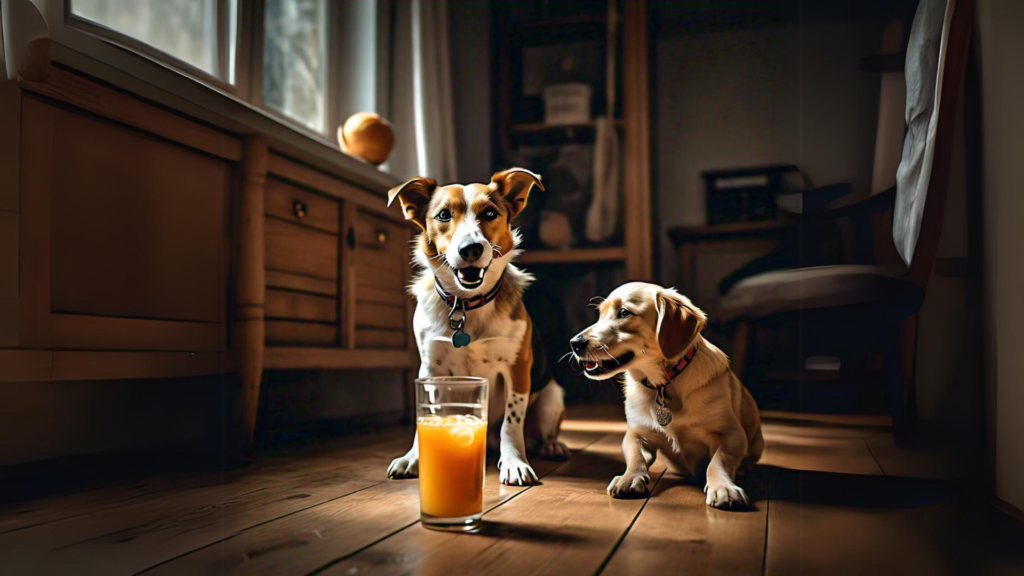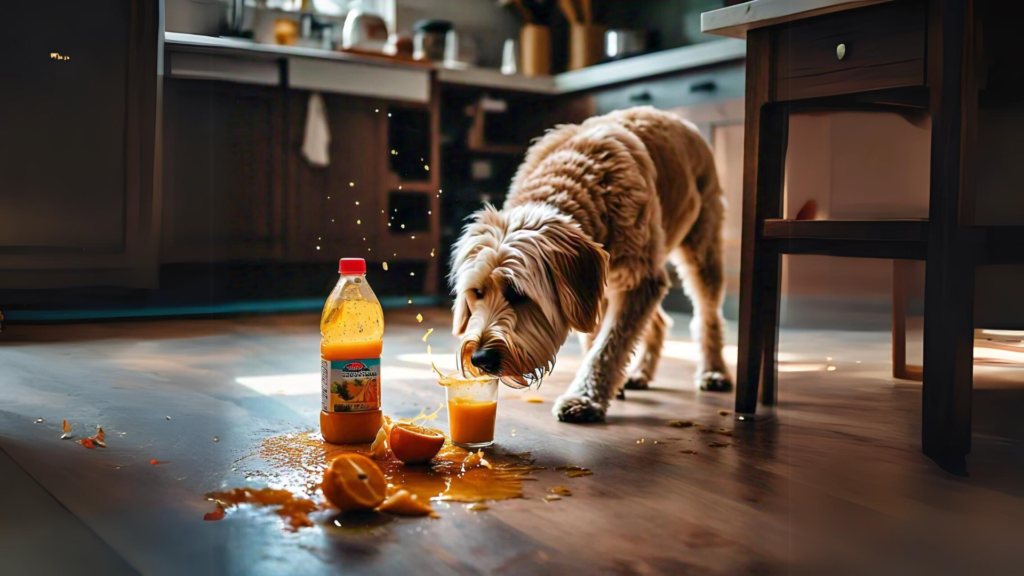You’re squeezing a juicy orange, the sunshine scent filling your kitchen. Your furry friend, tail wagging a happy hello, looks up with those puppy-dog eyes. Sharing a sip of your morning vitamin C boost might seem like a harmless treat, but can dogs have orange juice? Hold on, because while the thought might be adorable, orange juice for dogs is a recipe for tummy trouble. So, before your pup ends up barking at the wrong juice, let’s explore the truth about canines and citrus.
Can Dogs Have Orange Juice?
No, dogs cannot have orange juice. While orange juice might seem like a harmless treat, it’s actually not suitable for your canine companion. This citrusy drink packs a punch of sugar and acid that can upset their delicate digestive system.
Health Risks of Orange Juice for Dogs
Orange juice might seem like a refreshing pick-me-up, but for your dog, it can wreak havoc on their digestive system. Here’s a breakdown of the culprits:
- Citric Acid: This tart ingredient is like a bully to your dog’s stomach lining. It can cause irritation, leading to unpleasantness like vomiting or diarrhea.
- Sugary Shock: The high sugar content in orange juice is a double trouble for dogs. It disrupts their blood sugar regulation, which can be especially risky for diabetic dogs. All that sugar also feeds bad bacteria in the mouth, promoting dental problems.
- Mystery Additives: Store-bought orange juice often contains artificial sweeteners, preservatives, and coloring agents. These extras can be confusing and potentially harmful to your dog’s system. They can cause digestive upset or allergic reactions.
Canines and Orange Juice: Specific Situations

Can Dogs Have Orange Juice With Pulp?
While the pulp might seem like a source of beneficial fiber for your pup, it doesn’t change the risks. Dogs get their fiber needs met through a balanced diet. In fact, excess pulp can actually cause digestive issues like diarrhea.
Does Orange Juice Help With UTI (Urinary Tract Infection)?
There’s a common misconception that citrus fruits like oranges help with urinary tract infections (UTIs). However, there’s no scientific evidence to support this claim in dogs. If you suspect your dog has a UTI, consulting your veterinarian and getting them proper treatment is crucial.
Can Orange Juice Kill Dogs?
This is a scary question, but the good news is that orange juice itself isn’t likely to be fatal for dogs. The amount of citric acid and sugar in a typical serving wouldn’t pose a serious threat. However, it’s important to remember that large quantities could lead to discomfort and digestive upset. So play it safe and avoid giving your dog orange juice altogether.
A Dog’s Taste and Orange Juice

Can a Dog Taste Orange Juice?
Yes, dogs have the taste buds to perceive orange juice. They can detect sweetness and sourness like the citric acid in orange juice. They can also detect bitterness, potentially from the peel oils and saltiness.
However, that doesn’t mean you should let your dog have a taste test. Orange juice, while not inherently toxic, isn’t suitable for their digestive system and can cause tummy troubles.
Signs of a Dog Liking Orange Juice
Not all dogs react the same. Some might be curious and take a lick, while others might turn their noses up at the strong citrus scent.
Here are some signs your dog might show interest in orange juice:
- Licking their lips: This can be a general sign of curiosity or anticipation, not necessarily enjoyment.
- Drooling: Similar to lip licking, drooling can indicate interest in a new smell or taste, but shouldn’t be taken as a green light.
- Pawing at the glass: This could be your dog’s way of trying to get closer to the juice, but it’s important to remember that orange juice isn’t healthy for them.
Even if your dog exhibits these signs of interest, it’s crucial to resist the urge to share your orange juice. Remember, the sugar and acidity can cause digestive upset. Stick to water or dog-approved treats to keep your furry friend happy and healthy.
Training Dogs to Avoid Orange Juice
While orange juice isn’t inherently dangerous in small quantities, it’s best to discourage your dog from seeking it out. Here are some helpful tips:
- Management is Key: Keep orange juice and anything containing it out of reach. Ideally, store them in cabinets or on high shelves your dog can’t access.
- Positive Reinforcement: When your dog shows no interest in orange juice, lavish them with praise and healthy treats. This reinforces good behavior and teaches them what earns them rewards.
- Distraction is Your Friend: If your dog seems fixated on the orange juice, redirect their attention with a fun toy or engaging activity.
- Supervise During Meal Prep: When making orange juice, keep a watchful eye on your dog. This will prevent them from sneaking a taste or attempting to counter-surf for a sip.
- Teach “Leave It”: This valuable command can be applied to various situations, including avoiding off-limits foods like orange juice. Train your dog using high-value treats and gradually introduce distractions like the tempting orange juice.
By consistently implementing these tips, you can help your dog learn to avoid orange juice and keep their tummy trouble-free. Remember, patience and positive reinforcement are key!

What to Do if Your Dog Has Had Orange Juice?
If your dog snagged a sip, don’t panic. Monitor for signs of digestive upset like vomiting or diarrhea. If you’re concerned, consult your veterinarian.
Dog-Safe Juices
Orange juice is a no-go for our canine companions. But there are some dog-friendly juice options you can occasionally offer as a refreshing treat. Remember, water should always be their primary source of hydration.
A small amount of diluted apple juice (avoid cores and seeds!), carrot juice packed with vitamin A, or even vibrant beet juice (watch out for fur staining!) can be a healthy occasional treat. Always dilute juices with a 10:1 water-to-juice ratio to avoid concentrated sugar causing an upset stomach. Start with a tiny amount and monitor for any digestive issues. Skip store-bought varieties that might have added sugars, preservatives, and artificial flavors. If you do choose store-bought, opt for unsweetened, 100% juice. Remember, these dog-safe juices can be occasional treats, not a regular part of their diet. Water is always the best way to keep your dog hydrated and healthy.
Conclusion
While sharing your orange juice might seem like a sweet gesture, it’s best to skip it for your dog. Their digestive system isn’t suited for the high sugar and acidity in orange juice. They can lead to discomfort. Fresh water is always the best option to keep your pup hydrated. Remember, when it comes to “Can dogs have orange juice,” the answer is a clear no. But with love and proper care, you can keep your furry friend happy and healthy.